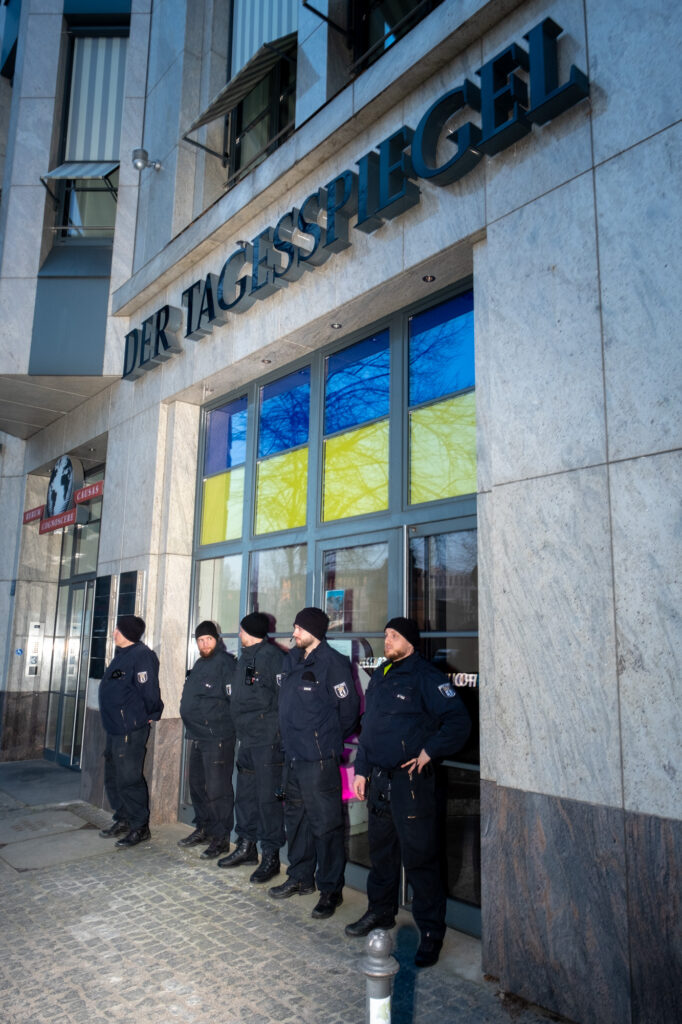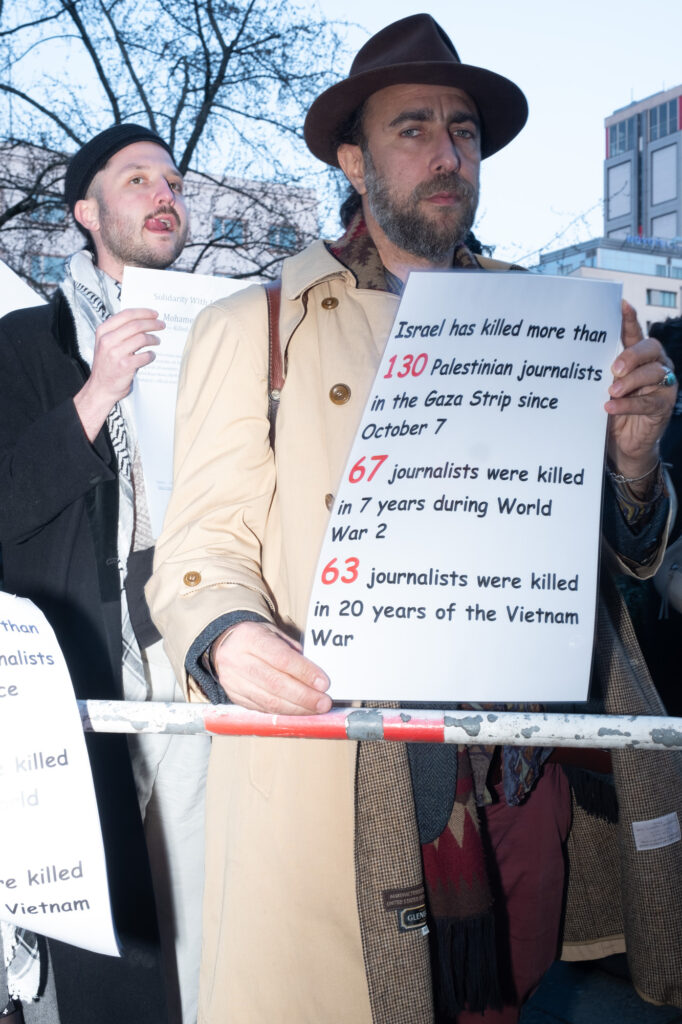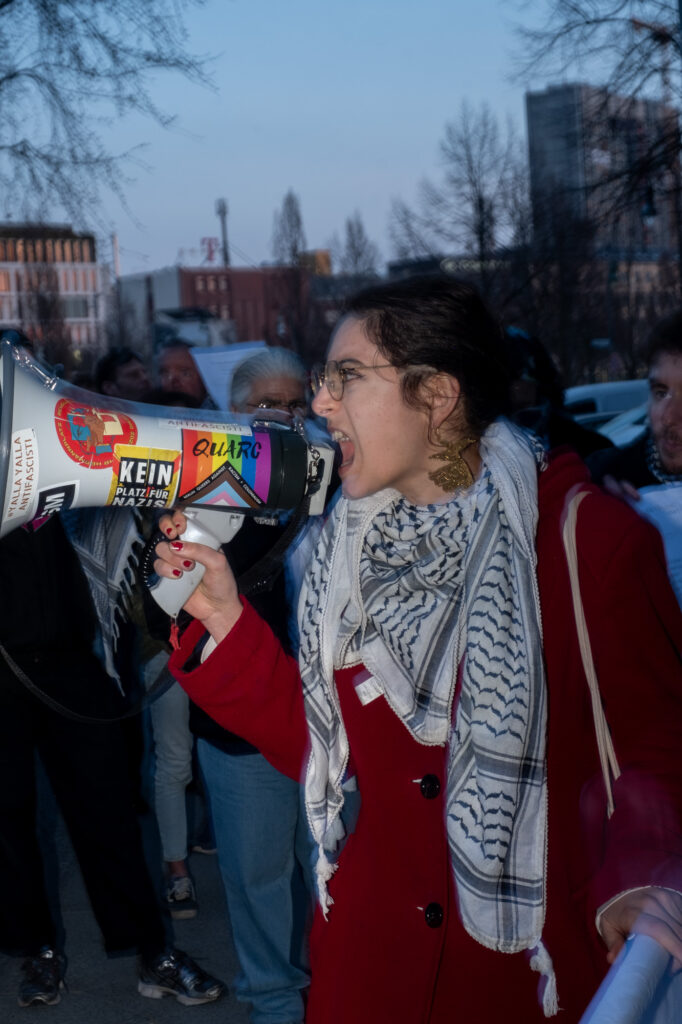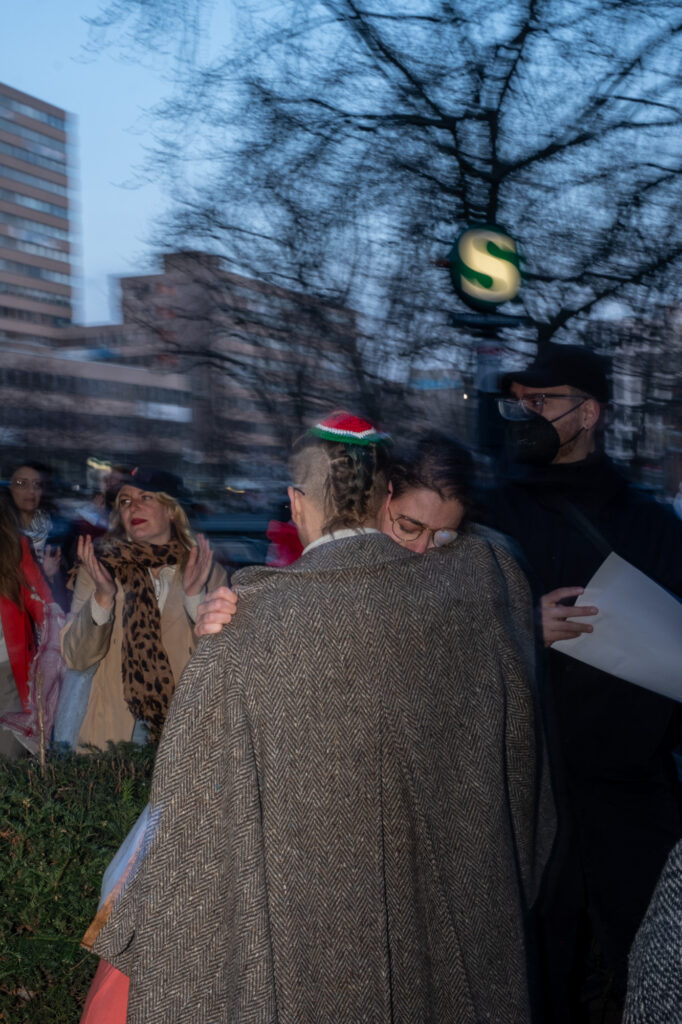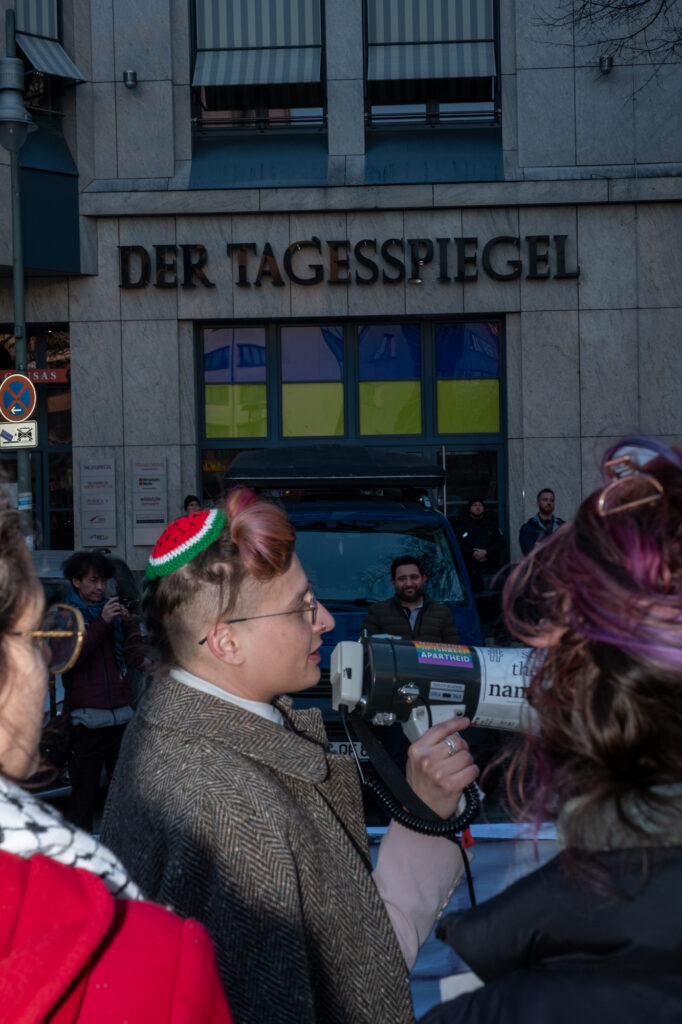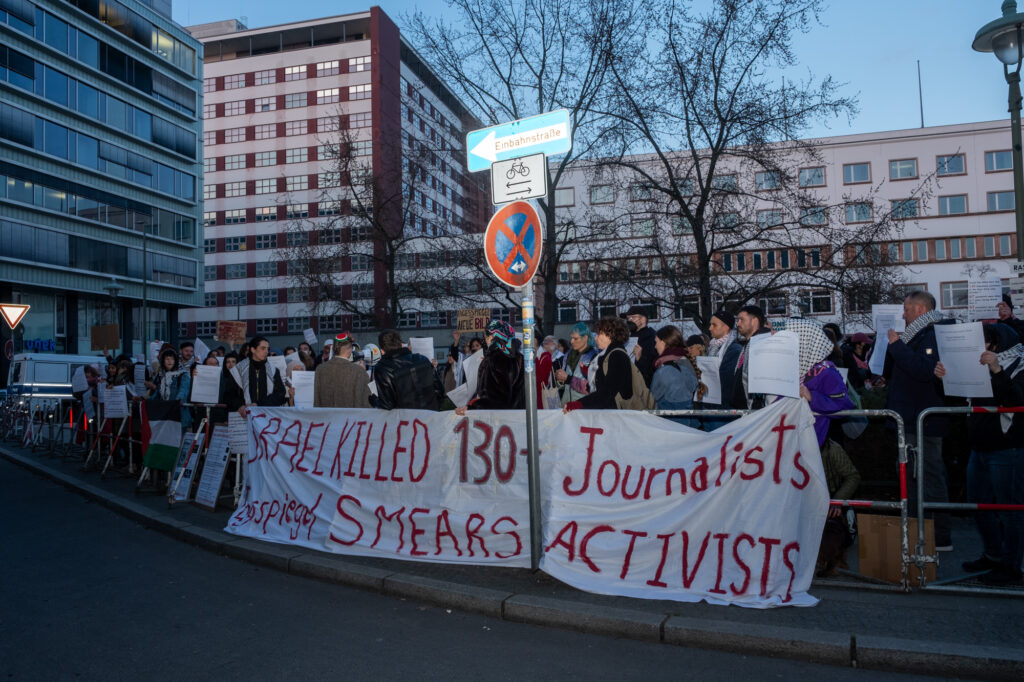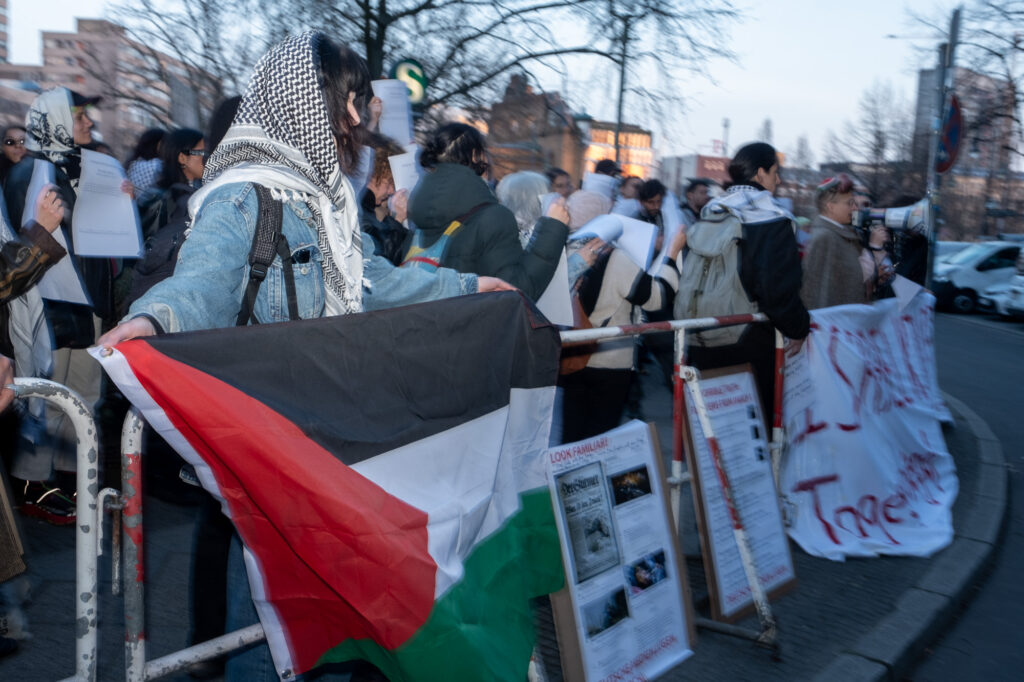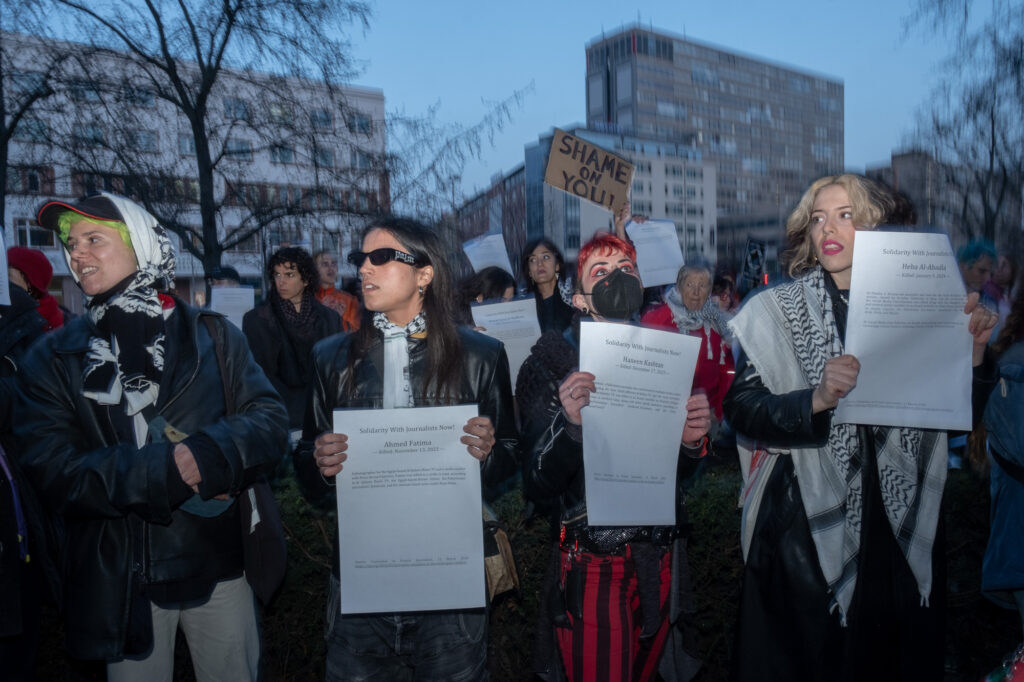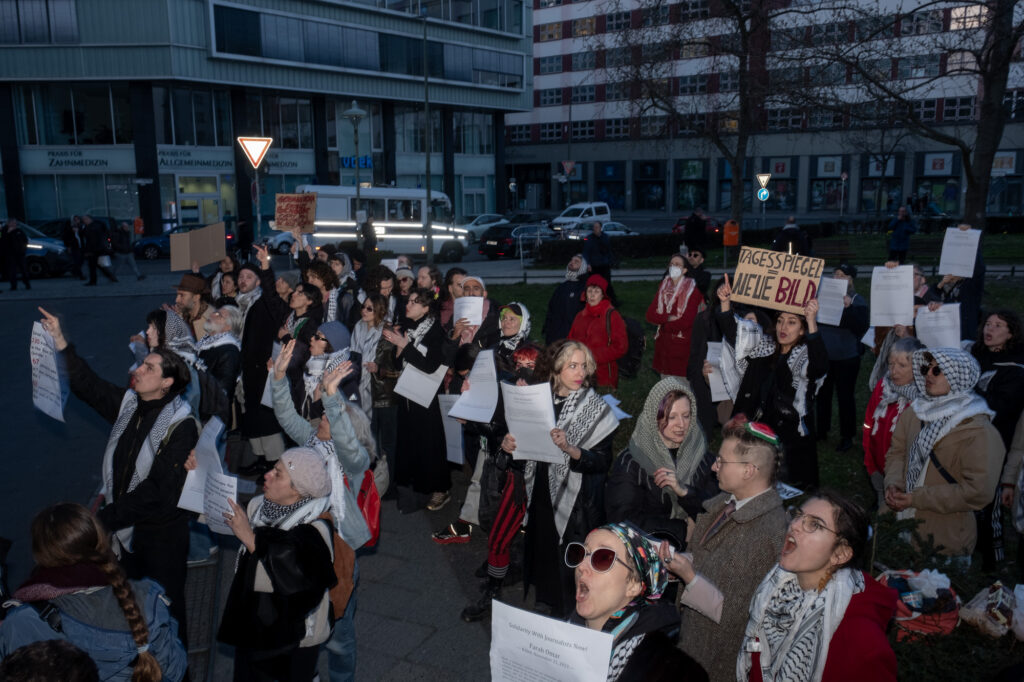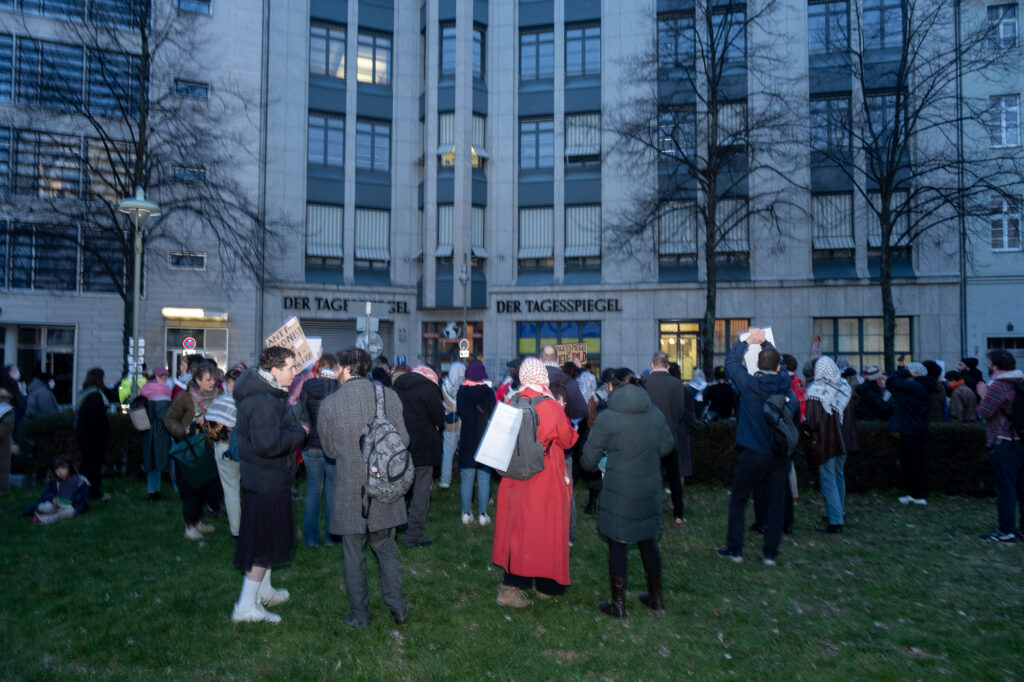On March 1st, 2024, the Tagesspiegel published an article titled “Die Stimme des Israelhasses: ‘Wenn Gewalt die einzige Option ist, werden wir sie anwenden’” [The voice of Israel-hatred:“if violence is the only option, we will use it”]. In response, a group of independent activists has assembled to demand integrity in the German media.
The article in question is a clear attempt to smear two Berlin-based activists and discount the broader Palestine-solidarity movement as the actions of lone agitators. It claims that two local (PoC) activists are inciting violence and quotes out of context statements about the Palestinian right to self-defense under Israeli occupation (as is enshrined in international law) as if they were direct threats.
It pits the accused activists against “moderate activists” who do not disrupt events but act with “reason and argumentation”. It reveals that one activist has been visited by law enforcement. Instead of calling out the heavy police repression of local activist groups, the article paints him as a criminal and antisemite.
The inclusion of the full names, faces, and workplaces of the activists, in combination with the claims made in the article, has clear potential to lead to harassment and even physical harm against them.
It is unacceptable that after 146 days of the ongoing destruction of Gaza, the Tagesspiegel is spending time and money on smearing and doxing local activists, rather than reporting honestly on the genocide unfolding in Gaza! On the night before the article was published, Israeli soldiers opened fire on around 1,000 starving Palestinians attempting to get food for their families, one of the deadliest incidents since October 7.
Two other things happened that day. According to the UN, the tenth child starved to death in Gaza. Joe Biden also announced the beginning of the cruel and dystopian aid drop program which has since killed 5 people due to parachute malfunctions, as reported by the BBC, CNN, and the Guardian. There are new and horrible things to report on every single day – an activist peacefully disrupting events to raise awareness of these horrors is not one of them!
On Wednesday, March 13th, the new campaign “Doxing is not Journalism” organised a protest outside the Tagesspiegel headquarters in Berlin. The protest aimed to draw a direct link between the killing of over 130 journalists in Gaza and the misdirection and concealment of the real news on the ground by the German media. It asked journalists of the Tagesspiegel: where is your solidarity with Palestinian journalists, your colleagues, who are working out of a war zone?
With every passing day, not only do conditions in Palestine become worse. It also becomes harder to report on them as the voices of Palestinians in Gaza, the West Bank, and Europe are systematically erased. Doxing is not Journalism demands honesty and integrity from our media. We deserve to see what we all know is happening and not be lied to about made-up terrorists inciting violence among us!
As a final note, we also see a worrying link from this moment to Germany’s own dark past. Newspapers in the 1930s wrongfully painted Jews in Europe and Germany as inciting violence and wishing war upon the West. Through the German media’s obsession with incorrectly labelling every critique of the Israeli government’s actions as antisemitic, it is committing the grave error of denying the ongoing genocide, diluting the meaning of antisemitism, and itself participating in inciting hatred toward an already marginalized group.
The most recent smear article was not the first incident in which Tagesspiegel painted Muslims in a similar light: previous articles have claimed that pro-Palestinian activists in Berlin were “called to violence” by Hamas, have generalized Palestinians in Gaza as “terrorists”, and have repeatedly pushed the narrative that any pro-Palestinian voices are antisemitic.
The protest called on Tagesspiegel and all German media to remember their power in shaping narrative and perception of different groups. German media in particular have a responsibility to name and expose ongoing genocides, as well as amplify rather than attack the voices of those trying to end the brutality.
The media must stop pitting “good” activists against “bad” activists, Jews against Muslims, and Germans against Palestinians. We will show Tagesspiegel that the pro-Palestinian movement in Berlin is strong, it is diverse, and it is not going anywhere!
Since the demonstration, there have been some developments. As a result, the demo organisers have made the following statement:
We are disturbed by how quickly even our small protest was condemned and shunned by the media. The German Journalists Union (dju) was quick to defend Sebastian Leber’s article in their own press release and condemn our protest as an attack on press freedom because “there is a strong public interest” in knowing who “disrupts events” and “calls for protests”. They again conflate peaceful protest with violence and radicalism. Even in the weeks which have passed since our first protest, the damage of the media representation of activists has become increasingly clear. The two activists who were named in the article (and even people with the same name but no relation to the activists themselves) have received numerous death threats. Just two days ago, their homes were raided by the state police in the middle of the night and their personal belongings were confiscated.
We continue to be disturbed by the worsening conditions for activists in this city and hope to bring international attention to the issue. As the Berlin senate debates the reintroduction of politically-motivated expulsion from university and the German media call for the banning of the upcoming “hateful” and “shameful” Palestine congress, we encourage everyone to keep spreading information through all possible channels, maintain scrutiny on the German press, and get active in their communities.
There follow extracts from some of the speeches from the March 13th demonstration. These have been shortened for reason of space. You can read the full speeches here.
Jara Nassar (artist)
What is the role of art while the world burns? It should look without prejudice. It should ask questions, foment hope, open and defend spaces for dialogue, not bury them. In German institutions, there is no more Art when it comes to Palestine and Israel. It’s there on the streets, in posters and workshops, in songs and banners, but not in museum and state theatres.
What is the role of journalism while the world burns? It should inform the public. It should point a critical finger at the powerful, the politicians and the corporations. It should challenge statements, contextualise events, and expose lies.
In the German newspapers, there is no more journalism when it comes to Palestine/Israel. Instead, there is racist agitation. A couple of examples.
Basel Adra and Yuval Abraham, the directors of the award-winning documentary No Other Land, call for an end to the occupation and an immediate stop to weapon exports to Israel. The German media fall all over themselves with accusations of antisemitism and hatred of Israel. The Tagesschau even calls the directors “perpetrators”. Germany provides Israel with a quarter of the weapons used for its war of extermination, and German “journalism” calls those who call on Germany to respect international justice “perpetrators”?
In his Oscar speech, Jonathan Glazer, the Jewish director of The Zone of Interest said: “We stand here as men who refute their Jewishness and the Holocaust being hijacked by an occupation which has led to conflict for so many people, whether the victims of October the 7th in Israel, or the ongoing attack on Gaza.” Die Welt then accuses Jonathan Glazer of abusing the Holocaust and Jewish victims.
Louder than the defamation of those who stand against the war of extermination in Gaza is only the silence about the atrocities of the Israeli military and the illegal settlers.
Over 130 journalists have been killed in Gaza since 7th October. Three were killed by Israel in apparently targeted attacks in Lebanon. Over 31,000 people have been killed in the most gruesome manner. But the targeted eradication of Palestinian and Arab life is not worth a story. Instead, as much credence is given to contrived assumptions by the Israeli army and German politicians, as to independent verifiable facts.
Language has power. This language, which the newspapers use, is dangerous. With the publication of such language, the newspapers make themselves directly responsible for violence against Palestinians, and anyone who shows solidarity with them.
It is the job of the press to critically report government propaganda and not to spread hatred, defame activists and artists, and justify war crimes. Dear newspapers, please do your job.
This speech was given in German. Translation: Phil Butland
Udi Raz (Jüdische Stimme)
It is a heartbreaking reality that we meet here today, 6 months into an ongoing genocide, because German journalists once again have failed to uphold their very basic responsibility towards journalistic integrity.
We gather here today, sisters, because we know that we all deserve better journalism. Especially in times of ongoing genocide, and especially by those who gaslight us with the claim that they have learned a lesson from their own genocidal experience.
But the fact is that in Germany 2024, we are still dealing with the de-Nazification process of German journalism.
About a month ago, my Jewish sibling HP Loveshaft, and my Palestinian brother Salah Said, were subjected to a smear campaign designed and executed by Thomas Heise and Anna Sadovnikova. A smear campaign that was promoted by Der Spiegel.
The journalists claimed that HP Loveshaft and Salah Said were promoting antisemitism.
In another case, less than two weeks ago, my Muslim sister Yasemin Acar was subjected to a smear campaign designed and executed by Sebastian Leber and which was promoted by the Tagesspiegel.
Among other things, Leber denounced my sister as “Israel-hater”.
“Israel-hater”? Seriously? Is this even an insult?
If this is the case, then according to this logic, 6 months into an ongoing genocide, and with more than 130 dead journalists, German journalism emerges as nothing less but journalism for genocide-lovers.
Zionism is not Judaism.
Accordingly, to free Palestine from Zionism means also to free Judaism from Zionism.
In this sense, Free Free Palestine!
Nat Skoczylas
Since October 7, the German media has launched an aggressive, deadly war against those who seek to amplify the voices of the oppressed, of those who stand against silence, of those who dare to look the death, mass destruction, starvation, torture, rape, and other forms of genocidal violence in the face.
Five months into this war, we’re close to 140 journalists dead in Gaza since October, which is a sum higher than those killed in the Vietnam war, 63 over 20 years. During five years of the Second World War, 69 journalists were killed. You also chose to ignore that over 70% of all journalists killed around the world in 2023 were your colleagues in Gaza, in a span of less than 4 months.
Meanwhile, what is Germany doing? Germany’s sales of weapons to Israel since October 2023 have increased tenfold. And the international law says “All States must ‘ensure respect’ for international humanitarian law by parties to an armed conflict, as required by 1949 Geneva Conventions and customary international law. States must accordingly refrain from transferring any weapon or ammunition – or parts for them – if it is expected, given the facts or past patterns of behaviour, that they would be used to violate international law.”
Has this been reported by you? How loudly have you been calling against your government’s complicity and going against the law?
As Germany yet again takes vigorous and active part in a genocide of a people whose horrifying displacement and occupation is a result of the Holocaust, the press all over the country actively supports the government and fabricates narratives that completely dismiss the suffering and the violence we’ve been witnessing live for weeks on end: of people dying under the rubble, being shot as they search for food, starved to death, and tortured.
I come from a town that was 40% Jewish for centuries, until 1939. I come from a family that fought to liberate Berlin, as my grandfather walked by foot from near the Ukrainian border to the Baltic Sea. I come from the area of Poland where Eichmann planned to move the Jews in one of the fascist fantasies of expanding the lebensraum. I grew up surrounded by the ruins and trauma of what war propaganda, hatred, lies, racism, fascism, white suprematism and colonialism can do to a people – the homes that stand empty until today, the graveyards that are stripped of their stones, the human lives that continue struggling with the despair and horrors it has produced and imprinted on us.
You, journalists, have the moral obligation to speak to the truth. To protect human lives, especially those at a greater risk. And whatever keeps you from doing it – you have to fight against it. We can’t afford another lost life, another day of that war, another minute of the occupation, another lie you get paid for.
No one is free until everyone is free, amen.
HP Loveshaft
Following October 7th, I had little patience for those who conflate concern for Arab lives with antisemitism. Having grown up in the wake of 9-11, I saw firsthand my friends called “terrorist sympathizers” for speaking up about atrocities committed in their names.
Since the publication of a video titled Demonstration Gegen Juden, I have been inundated with violent threats. I have questions for Spiegel, including:
-
Why did you spend a full minute going over my instagram account and pronouns, but neglected to mention I’m Jewish? How do your queer colleagues feel about this journalistic practice?
-
When will Salah Said, Mudi, Manar Ahmad, Yasmin Acar and other activists be invited for a warm studio interview, instead of getting shouted at in the middle of a demonstration?
-
Why did you neglect to mention the Zionists you present as victims are known violent instigators? Did their chants of “may your village burn down” fail to tip you off?
Do you think your ancestors would be proud of the way you stoke the embers of simmering racism in this country, giving every reactionary xenophobe carte blanche to act on their hatred of Muslim, Arab, Black and Brown people under the guise of “defending Jews”? Seeing as you opened with painting a target on a Jewish, Hirschfeld-quoting transsexual, I imagine they must.
What will you tell your children, or their children, about what it means to be German? How will you explain to them that this country repeated its greatest shame, on a global stage, as genocide was live-streamed on every portable screen in existence? How will you give them hope to be known for anything besides an unprecedented industrialization of hatred?
For more information about Doxing is Not Journalism, please send a mail to doxingisnotjournalism@proton.me
More pictures from the demo:
